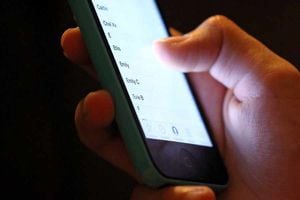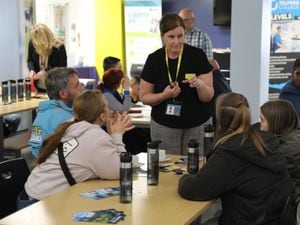Poll: Should mobile phones be banned from school?
School leaders in Shropshire today defended the use of personal electronic devices like tablets and phones amid calls for them to be banned from the classroom.

Headteachers insist the devices "enhance education activity and learning". It follows concerns raised by schools inspectorate Ofsted over secondary-aged pupils using their phones at school.
Behaviour expert Tom Bennett is to look into the impact of devices used by pupils under an expansion of his investigation into how to train teachers to tackle poor behaviour, Schools Minister Nick Gibb said.
Mr Bennett said: "Technology is transforming society and even classrooms – but all too often we hear of lessons being disrupted by the temptation of the smartphone.
"Learning is hard work and children are all too aware of this. So when they have a smartphone in their pocket that offers instant entertainment and reward, they can be easily distracted.
"This is a 21st century problem and the majority of schools are dealing with it effectively. But I will now probe deeper into this issue, and behaviour challenges more broadly, to uncover the real extent of the problem and see what we can do to ensure all children focus on their learning."
Alex Raeside, headteacher of Sundorne and Grange secondary schools, both of which are operated by Shrewsbury Academies Trust, is against the move as the school believes they are beneficial as long as they are used "in a structured and appropriate fashion".
He said: "Sundorne and Grange Schools allow students to bring mobile technologies into school.
"We believe that it is highly beneficial for these devices to be used in a structured and appropriate fashion to support learning in the 21st century.
"The school has clear policies and procedures regarding such devices, which the students follow.
"This approach enables students to develop a responsible attitude to mobile technology usage."
In May, London School of Economics academics released a study of schools in Birmingham, London, Leicester and Manchester which suggested restricting mobile phone use could improve results.
In December, Ofsted's annual report disclosed a seven percentage point drop in the proportion of secondary schools where behaviour and safety were judged good or outstanding in 2013/2014, compared with 2012/13.
It said there were several problems, one of which was too many instances of pupils "using their mobiles".
Phil Loveday, headteacher at Bridgnorth Endowed School, said the key was to ensure rules are observed. He said: "Our policy allows students to use them at break and lunchtimes but not in the classroom unless directed by the teacher. Our aim is to teach students how to use the technology in a professional manner so that when they move into the world of work they have an understanding of expected behaviours, such as using it during their breaks not when they are engaged in their job.
"We moved from banning phones to educating our young people in how to use them because our core purpose is to provide a full and rounded education for the adults of the future."
Russell Griffin, spokesman for Telford & Wrekin Council, said use of phones was "not a straightforward issue". He said: "Schools have been successfully utilising the technology that smart phones offer to enhance educational activity and learning in the classroom.
"Individual schools will have developed their own policies on the use of smart phones and electrical devices – recognising that the range of other material available to students can present a unique challenge for teachers nowadays." The Government said that GCSE results at the Ebbsfleet Academy in Kent had almost doubled since the school banned smartphones in 2013. Mr Gibb said ministers needed to be sure the advice given to teachers "is fit for the 21st century when even primary school pupils may be bringing in phones or tablets."
He added: "Whether it is the use of mobile phones in schools or the attitudes of parents to their child's behaviour in class, we will now probe deeper into behaviour more generally to ensure that no child has to put up with having their education disrupted by misbehaviour."
Christine Blower, general secretary of the National Union of Teachers, said: "We are glad that Tom Bennett recognises that the majority of schools are dealing effectively with the challenges of smartphones in class, and that his approach to this question will be an evidence-based one. It is important to remember that technology, including the use of smartphones, can be part of successful teaching and learning strategies.
"Schools and teachers work hard to ensure that pupils are focussed on class activities. The best results are achieved when schools' behaviour policies set out expectations around smartphones, which are then consistently implemented."





